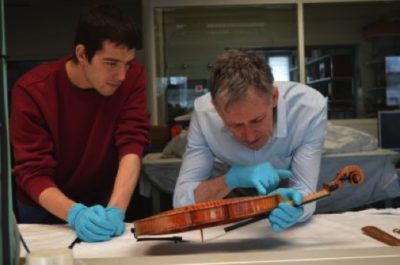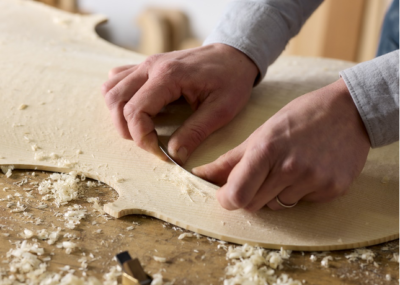Violin making training usually takes place in a college setting. The students are typically a hugely mixed bunch of ages and nationalities. They come from very diverse backgrounds; some are skilled musicians, some can’t play a note. Some already have well-developed tool skills and some prior experience of instrument making; for those that don’t, the courses will start them from scratch. The really important factor is a deep desire and commitment to learn the craft and to put in the necessary time and effort to develop the skills of hand and eye coordination, and to learn to listen to instruments analytically.
Newark School of Violin Making

By a historical accident, the small market town of Newark in the East Midlands is home to one of the largest schools of violin making in the world, with up to 90 students at any one time. The course begins with a foundation year for those with little or no woodworking background. During this year, students make many of the parts of a violin, whilst learning to sharpen tools, make tools, and master basic woodworking skills using hand tools. This year provides a natural progression onto the first year of the BA Hons degree course, when students refine and develop niche skills in violin making, whilst making two instruments ‘in the white’.
Students also have to complete a module in the historical context of violin making. The second year of the degree is  spent learning repair and restoration, with in-depth lectures on varnishing and setting up instruments, which allows students to complete their handmade instruments as well as set up their repair instruments. Many students also continue their making alongside their restoration projects. There is also an option to take a module in viola making, and develop a greater understanding of the acoustics of the instrument. During their third year, students can specialise in the areas of specific interest to them in making or restoration, and many opt to make a cello. The end of the year closes with a Professional Standards Test. Newark college is unique in having a well equipped engineering department, designed to support students in making their own tools. Applications for the course are now processed through UCAS.
spent learning repair and restoration, with in-depth lectures on varnishing and setting up instruments, which allows students to complete their handmade instruments as well as set up their repair instruments. Many students also continue their making alongside their restoration projects. There is also an option to take a module in viola making, and develop a greater understanding of the acoustics of the instrument. During their third year, students can specialise in the areas of specific interest to them in making or restoration, and many opt to make a cello. The end of the year closes with a Professional Standards Test. Newark college is unique in having a well equipped engineering department, designed to support students in making their own tools. Applications for the course are now processed through UCAS.
 For more information about what the course entails or what it is like to be a student in Newark, you can message a student representative via the Instagram page or email the course leader. The college phone number is 01636 613687.
For more information about what the course entails or what it is like to be a student in Newark, you can message a student representative via the Instagram page or email the course leader. The college phone number is 01636 613687.
https://musicalinstrumentcrafts.co.uk/courses
In 2022-3 the Newark School of Violin Making celebrates its 50th anniversary. This has been marked with the publication of booklet about the history of the school (on sale here). It includes interviews by Ariane Todes with staff and alumni. Ariane has also written an interesting blog piece about the history and ethos of the school through to its current situation. https://elbowmusic.substack.com/p/a-very-british-tradition
South Thames College
 Merton College, London has been running instrument making courses for over 40 years. Instrument making courses for beginner, intermediate and advanced students are offered on courses of one or two days a week. Although making instruments is a large focus of the courses, the college also has a particular strength in teaching violin repair and setup alongside making. Alumni have found employment in some of the London restoration workshops, and setting up their own businesses.
Merton College, London has been running instrument making courses for over 40 years. Instrument making courses for beginner, intermediate and advanced students are offered on courses of one or two days a week. Although making instruments is a large focus of the courses, the college also has a particular strength in teaching violin repair and setup alongside making. Alumni have found employment in some of the London restoration workshops, and setting up their own businesses. The college has run violin making and repair courses for years within a broader musical instrument technology department that encompasses guitar and woodwind making and repair. The mix of full-time and part-time places gives the course a high intake of mature students. The focus tends towards repair but also includes making instruments.
The college has run violin making and repair courses for years within a broader musical instrument technology department that encompasses guitar and woodwind making and repair. The mix of full-time and part-time places gives the course a high intake of mature students. The focus tends towards repair but also includes making instruments.
https://stcg.ac.uk/merton-college/musical-instrument-making-and-repair
West Dean College Arts and Conservation

West Dean has a number of instrument-making programmes from short intensive courses to a full-time Foundation Degree, BA Hons programme and the only postgraduate Musical instrument-making course in the UK in the form of an MFA in Craft Practice. The college generally has between 15 and 20 musical instruments students studying on its full-time courses at any time. West Dean prides itself on a high tutor: student ratio of 1:8. Run by the Edward James Foundation, West Dean connects today’s students with a rich heritage of art and craft.
The programme is internationally respected for the high level of consummate craftsmanship of its graduates. The skills acquired in the course can be applied to making a wide range of stringed instruments, both bowed and plucked including viola da gamba, violin and guitar. Students can expect to complete between one and three instrument-making projects a year.
Also within the college are departments that make, restore and conserve ceramics, clocks, furniture and books, providing training for conservators in museums and libraries all over the world, as well as a fine art department and an extensive range of short courses so you are surrounded by a community of like-minded creative practitioners.

01243 818291
https://www.westdean.org.uk/study/degrees-and-diplomas/courses/west-dean-college-diploma-musical-instruments